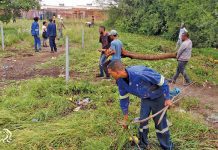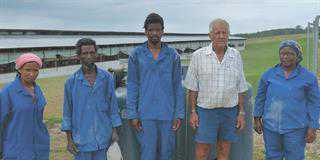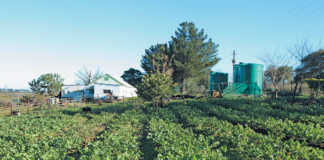When textile worker Mike Moloto (47) of Soshanguve Block S lost his job four years ago, he managed to save his family from a life of poverty and keep his three children in school by starting a small farming operation in the middle of the township. With few resources, he turned what used to be a dump site into a flourishing smallholder vegetable plot. Now Mike produces spinach, Chinese spinach and chomolia, which he markets informally at the Mabopane Train Station. “I couldn’t let my children starve while I had two hands and a brain,” he says.Born in Lennes, a small village in Limpopo about 100km from Mokopane, Mike headed south to look for a job. In 1993, he landed a job at textile manufacturing company Jatex SA in Rosslyn, about 30km north of Pretoria. He worked there for 17 years. But in 2006, Jatex SA went bankrupt. Mike and thousands of other employees found themselves jobless. With unemployment so high, finding another job was almost impossible.
Taking initiative
With his family facing starvation, Mike decided to start his own business selling vegetables.He realised the Mabopane train station would be a big market for fresh produce. It’s a busy place and commuters buy produce from hawkers there. The hawkers source their stock from the Tshwane Fresh Produce Market. But Mike decided he would grow his own vegetables.The only available land near to where he lived was a piece for ground with a stream on it, used as an illegal dump, which polluted the stream. Mike got to work. Without permission from the municipality, he started clearing the area – a task that took him six months to complete.“Without any equipment, it was very difficult,” he recalls. “The area was full of rubbish and weeds. I had to hire people to help me clear the place.” When he finished, in 2007, Mike started preparing the land for planting. Because he was just starting out, he only planted spinach.
Mike’s plot is less than 1ha in size and he’s bought a pump that he uses to irrigate the vegetables. “Because there isn’t any form of security here, I have to carry all my equipment with me to the plot and back,” he says. Every afternoon after working on the plot, Mike harvests fresh spinach and drives his old bakkie to the station to catch the after-work rush. “That’s the peak time for trade,” he says. “There’s no need to hang around at the station the whole day, as most people get their supply after work on their way home to start supper.” Many of Mike’s Zimbabwean customers asked if he could plant chomolia, a vegetable widely farmed in Zimbabwe. Seeing the demand increasing, Mike complied. Chomolia only needs to be watered once a week. It also has a longer life span than regular spinach, and can be harvested for more than a year.
Adding poultry to the mix
Once his vegetable plot was up and running, Mike established a poultry operation nearby, which he financed from the proceeds of his vegetable farm. He started with about 800 chickens, which he marketed informally. He sold them to hawkers in bulk, and sold some himself. But now he’s scaled down to about 400.“When I started, feed wasn’t that expensive and I could afford to keep the chickens for a few more days, even if I couldn’t sell them all,” Mike says. “But with input costs rising all the time, it’s harder to stay competitive. The hawkers buy their produce from the market, which gives them a better deal. “I can’t sell my produce at a higher price to cover my input costs. If I had a more land, I could compete.
A little financing could go a long way
“At the moment I can’t enter the formal market as I need financing.” And he also needs land he has permission to use. “Most of the formal market people want a consistent supply, or a signed supply contract,” Mike explains. “I could find myself in a bad position if I go into formal markets.” Financing would also enable him to buy the equipment he so desperately needs. But Mike hasn’t yet approached the land affairs department as he wants to get some formal agricultural training first. “Once I’ve learnt as much as I can about farming, I’ll approach the department for land,” he says. Contact Mike Moloto on 078 127 2100. |fw













